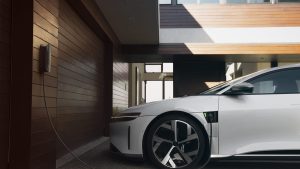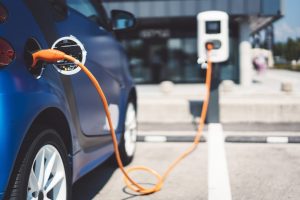Guest Post by Eric Peters

Why are those pushing EVs not being honest about EVs? It says something about EVs – and about those who are pushing them, does it not?
For instance, if there really is a “climate crisis” – in italics to emphasis what the word is generally taken to mean, that being an imminent disaster – then why is it that high-performance and luxurious EVs are being pushed? Can we afford to indulge such . . . luxuries, if there is a “crisis”?
Wouldn’t prudence dictate minimalist EVs that use the least amount of energy possible? So as to reduce the amount of “carbon” – their new term for what was previously (and less alarmingly, etymologically) “C02” or “carbon dioxide” – that is produced in the process?
It is a fact that every EV on the market is gratuitously wasteful of energy.
All of them use more more energy than is necessary to make a basic vehicle and to provide basic transportation – as opposed to luxurious vehicles and “ludicrous” acceleration. EV trucks tout Herculean towing capacity – however briefly – and the ability power high-draw tools all day, all of which burns up a lot of electricity and results in the “emitting”of a lot of excess “carbon.”
Speaking of that latter.
It is interesting – it speaks to motive – that the terminology used to define the debate shifts in this way, as well as the prior way. The intent is obvious. When most people hear the word carbon, what do they reflexively think of?
Why, something dirty.
Like the graphite – the carbon – in a pencil that stains your white shirt. The intended association is to link carbon with pollution – as in “dirty” skies, a fouled environment. Which they have already done via use of the word emission in the context of carbon dioxide, a non-reactive gas that does not cause pollution – by conflating it with the memory of the compounds that did cause it.
So as to get those who hear it to accept the necessity of regulating “carbon.”
That necessity rendered more so – urgently! – by characterizing what had been a “changing” climate (much too etymologically gradual to foster the necessary urgency) into one that is in”crisis.”
One so urgent – so dire! – that it is not necessary to reduce the production of “carbon” “emissions” to the bare minimum. Instead, almost obscenely wasteful EVs are heralded as the way to salve this “crisis.”
And it’s true, in a way.
Just not in the way most people have been led to believe it is.
The actual “crisis” is one of generalized affluence – too many ordinary people driving too many cars, wherever they like. It diminishes the prestige of owning a very expensive car – for those who’d prefer we walk.
And it winnows the power of those who want us to walk.
The way to salve this “crisis” is by using EVs to make it so expensive to drive that most of them – by which they mean us – can no longer afford to. So they tell us that our cars – the non-electric ones we can afford – are causing a “crisis” and that the way to salve it is by getting rid of them in favor of electric cars, knowing that most of us cannot afford to buy them and also that most of us soon won’t be able to afford to charge them, either.
You may have read about that.
Then again, probably not – because most of the same “media” outlets sounding the alarm about the “crisis” aren’t saying anything about a real one – the alarming increase in the cost of electricity, caused in part by those pushing EVs, which increases demand for electricity at the same time that the supply of it is not being increased to match.
In Britain, it now costs more to charge an EV than it does to fill up the tank of a non-EV. And in Britain, gas costs about $6 per gallon.
You get the idea.
And why aren’t people being told the truth about such facts as these:
“Fast” charging is hard on EV batteries and likely to shorten their useful service life. This is clearly stated in the manuals that come with new EVs, such as the Ford F-150 Lightning this writer test drove a few months ago (more about that, here). This means you can save time – or lose money (again) when the battery has to be replaced sooner rather than later.
You cannot fully “fast” charge an EV.
A limit – 80 percent of capacity – is built in, to (once again) avoid harming the battery and to reduce the risk of a fire. Put another way, you resume your drive with 20 percent less range than the advertised fully charged range. And since most EVs don’t start out with much range – even when fully charged – you leave the “fast” charger with the non-EV equivalent of about half a tank of gas.
This means you will be visiting the “fast” charger again, sooner. And that your waits will be longer – because you will be waiting more often.
Why don’t they tell you what it costs to charge an EV at home? What it costs to modify your home so as to be able to charge an EV at home in less time than all day long? Or that once you have modified it, you still won’t be able to “fast” charge it at home? 
Why is it that the government – the primary pusher of EVs – is so persnickety about the miles-per-gallon figures touted by manufacturers of non-electric vehicles – and recalls them when they’re off by single digits – so indifferent to range-per-charge being routinely off by double digits?
Just as it is now – finally, at last – conceded that the gene therapy drugs sold as “vaccines” did not prevent people from getting sick or spreading sickness to others, so also it is now acknowledged that EV range goes down – considerably – when it is cold. When power-drawing accessories are used. When the EV is driven uphill – and at real-world highway speeds.
These are important facts – and they are being purposefully, systematically obscured.
Why?
Well, for essentially the same reason that it was kept from people that the MRNA gene therapy drugs they were tricked (and pressured) into taking did not “stop the spread,” as they were explicitly told they would.
When you realize you’re being serially lied to, what is the proper conclusion to be drawn?
The question ought to answer itself.
It is my sincere desire to provide readers of this site with the best unbiased information available, and a forum where it can be discussed openly, as our Founders intended. But it is not easy nor inexpensive to do so, especially when those who wish to prevent us from making the truth known, attack us without mercy on all fronts on a daily basis. So each time you visit the site, I would ask that you consider the value that you receive and have received from The Burning Platform and the community of which you are a vital part. I can't do it all alone, and I need your help and support to keep it alive. Please consider contributing an amount commensurate to the value that you receive from this site and community, or even by becoming a sustaining supporter through periodic contributions. [Burning Platform LLC - PO Box 1520 Kulpsville, PA 19443] or Paypal
-----------------------------------------------------
To donate via Stripe, click here.
-----------------------------------------------------
Use promo code ILMF2, and save up to 66% on all MyPillow purchases. (The Burning Platform benefits when you use this promo code.)






Yes cerritos Eric.
Who is telling us?
And Who is benefiting?
Modern electric vehicles are overweight impractical behemoths. Electrical vehicles could be made much lighter and with fewer bells/whistles…but their Achilles is always going to be the battery weight.
There really is only one practical solution for the EV/battery life conundrum:
Swappable battery assemblies.
Of corse all EV batteries would have to be standardized.
They already do this with electric forklifts.
If there were fast swap battery stations spaced correctly, one could swap a battery assembly faster than filling up a tank of gas.
Still won’t change the fact that petroleum ounce for ounce has far higher Useable energy density and practicality than batteries.
Anywhoo…
Excellent article Mr Peters.
“There really is only one practical solution for the EV/battery life conundrum:
Swappable battery assemblies.”
I would only slightly modify your words here. There are NO really practical solutions — but of all the possibilities, swappable battery assemblies comes the closest to being practical. If I were forced to drive a battery car, being able to quickly swap the battery would at least make the car functional.
If the environmentalists were truly concerned with lowering pollution they would be pushing small turbo diesel hybrids with none of those complicated transmissions. Just a generator that kicks in to charge a relatively small battery that goes to an all electric drive..
I think an internal combustion engine driving a generator, which in turn would drive individual wheel motors could be a simple solution that could feasibly deliver 60-100mpg if done light.
You’ve just described the most efficient way of moving freight long distances–the modern Diesel-Electric locomotive.
Yes, I believe diesel would make a good powerplant.
Especially since diesel is so stable in storage.
…but, but, but BETTER than Electric?
This one is fear or fish propelled:
https://youtu.be/F7MGnkig7zc
How big is this battery to be swapped?
10 ton crane needed!
No.
Forklift battery swap out:
I saw diesel at the same price as regular unleaded today at $3.09/gallon.
I’m glad they have not thought of selling fuel by the BTU yet.
I cannot believe there are only 2 posts in response to this article. So here goes my rant…
There is NO CLIMATE Emergency! NONE, NADA, ZIP. What this administration is trying to do is get the population totally dependent upon electricity, for all vehicles including semi’s, passenger cars, buses, etc. AND making electricity the power of choice for cooking, cooling, heating, etc. etc.
Once this is accomplished, the supply of electricity will be rationed to those who “go along to get along” with the new digital currency. Or they will inflict an EMP on us to further their goals of genocide.
Unless we band together and take action very soon, our goose is cooked.
My father had a Prius and the gas engine made it so you at least didn’t get stuck looking for a charger. It was a roomy little car that got a 48 MPG average in winter and 51 when it warmed up. It never broke down. My dad did show me an article about how dirty its production really was and the only negative I can come up with is that the special tires it had didn’t do well in snow.
I think it’s all about controlling people and creating a way to fleece people of money. My state is looking to spend millions putting in chargers. I can only imagine the backdoor deals and kickbacks. I think people are going to be really unhappy when we all share the costs associated with EVs. Nobody talks about what electricity will cost in the future. You would think it was free by the lack of interest in this.
I do think a golf cart or small EV that you can charge from solar may be a good idea in a future where gasoline will be rationed out with a CBDC. The plan is to discourage vehicle ownership and limit your travel. I looked at the electric bicycles also, but I wouldn’t charge them inside or where they can catch fire and burn ur house down.
Call me when you can build any of that crap without coal, oil and gas. Can’t be done.
Baking soda and vinegar car?
The “environmental” cost of producing an EV is much higher than an ICE vehicle. Huge, heavy batteries have a limited range and life, and are not recyclable. The current power grid is old, outdated, and woefully inadequate to charge millions of “green” EVs. When the actual costs of generating the electricity, transmitting it over power lines (with significant losses along the way), and using a charging station (also with losses) are considered, EVs are more expensive to run. Also love how the Ford Lightning was able to pull the loaded trailer a whopping 68 miles. TPTB have a goal of making us serfs completely immobile and are furiously trying to bring this about through regulation and legislation. 15 minute cities are just the latest salvo in the war on humanity. And forget having a bike, as petroleum products are used for some parts. Stay in your government-provided apartment, eat only approved insects, forget about any medical care, and plan ANY purchases carefully, lest your social credit score dips far enough to have your CBDCs confiscated. What a bright, shining, diverse, inclusive, and tolerant Brave New World we are headed for.